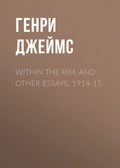
Генри Джеймс
The Jolly Corner
There was happily enough to say, on so consecrated a spot, that could be said freely and fairly; so that a whole train of declarations was precipitated by his friend’s having herself broken out, after a yearning look round: “But I hope you don’t mean they want you to pull this to pieces!” His answer came, promptly, with his re-awakened wrath: it was of course exactly what they wanted, and what they were “at” him for, daily, with the iteration of people who couldn’t for their life understand a man’s liability to decent feelings. He had found the place, just as it stood and beyond what he could express, an interest and a joy. There were values other than the beastly rent-values, and in short, in short—! But it was thus Miss Staverton took him up. “In short you’re to make so good a thing of your sky-scraper that, living in luxury on those ill-gotten gains, you can afford for a while to be sentimental here!” Her smile had for him, with the words, the particular mild irony with which he found half her talk suffused; an irony without bitterness and that came, exactly, from her having so much imagination—not, like the cheap sarcasms with which one heard most people, about the world of “society,” bid for the reputation of cleverness, from nobody’s really having any. It was agreeable to him at this very moment to be sure that when he had answered, after a brief demur, “Well, yes; so, precisely, you may put it!” her imagination would still do him justice. He explained that even if never a dollar were to come to him from the other house he would nevertheless cherish this one; and he dwelt, further, while they lingered and wandered, on the fact of the stupefaction he was already exciting, the positive mystification he felt himself create.
He spoke of the value of all he read into it, into the mere sight of the walls, mere shapes of the rooms, mere sound of the floors, mere feel, in his hand, of the old silver-plated knobs of the several mahogany doors, which suggested the pressure of the palms of the dead the seventy years of the past in fine that these things represented, the annals of nearly three generations, counting his grandfather’s, the one that had ended there, and the impalpable ashes of his long-extinct youth, afloat in the very air like microscopic motes. She listened to everything; she was a woman who answered intimately but who utterly didn’t chatter. She scattered abroad therefore no cloud of words; she could assent, she could agree, above all she could encourage, without doing that. Only at the last she went a little further than he had done himself. “And then how do you know? You may still, after all, want to live here.” It rather indeed pulled him up, for it wasn’t what he had been thinking, at least in her sense of the words, “You mean I may decide to stay on for the sake of it?”
“Well, with such a home—!” But, quite beautifully, she had too much tact to dot so monstrous an i, and it was precisely an illustration of the way she didn’t rattle. How could any one—of any wit—insist on any one else’s “wanting” to live in New York?
“Oh,” he said, “I might have lived here (since I had my opportunity early in life); I might have put in here all these years. Then everything would have been different enough—and, I dare say, ‘funny’ enough. But that’s another matter. And then the beauty of it—I mean of my perversity, of my refusal to agree to a ‘deal’—is just in the total absence of a reason. Don’t you see that if I had a reason about the matter at all it would have to be the other way, and would then be inevitably a reason of dollars? There are no reasons here but of dollars. Let us therefore have none whatever—not the ghost of one.”
They were back in the hall then for departure, but from where they stood the vista was large, through an open door, into the great square main saloon, with its almost antique felicity of brave spaces between windows. Her eyes came back from that reach and met his own a moment. “Are you very sure the ‘ghost’ of one doesn’t, much rather, serve—?”
He had a positive sense of turning pale. But it was as near as they were then to come. For he made answer, he believed, between a glare and a grin: “Oh ghosts—of course the place must swarm with them! I should be ashamed of it if it didn’t. Poor Mrs. Muldoon’s right, and it’s why I haven’t asked her to do more than look in.”
Miss Staverton’s gaze again lost itself, and things she didn’t utter, it was clear, came and went in her mind. She might even for the minute, off there in the fine room, have imagined some element dimly gathering. Simplified like the death-mask of a handsome face, it perhaps produced for her just then an effect akin to the stir of an expression in the “set” commemorative plaster. Yet whatever her impression may have been she produced instead a vague platitude. “Well, if it were only furnished and lived in—!”
She appeared to imply that in case of its being still furnished he might have been a little less opposed to the idea of a return. But she passed straight into the vestibule, as if to leave her words behind her, and the next moment he had opened the house-door and was standing with her on the steps. He closed the door and, while he re-pocketed his key, looking up and down, they took in the comparatively harsh actuality of the Avenue, which reminded him of the assault of the outer light of the Desert on the traveller emerging from an Egyptian tomb. But he risked before they stepped into the street his gathered answer to her speech. “For me it is lived in. For me it is furnished.” At which it was easy for her to sigh “Ah yes!” all vaguely and discreetly; since his parents and his favourite sister, to say nothing of other kin, in numbers, had run their course and met their end there. That represented, within the walls, ineffaceable life.
It was a few days after this that, during an hour passed with her again, he had expressed his impatience of the too flattering curiosity—among the people he met—about his appreciation of New York. He had arrived at none at all that was socially producible, and as for that matter of his “thinking” (thinking the better or the worse of anything there) he was wholly taken up with one subject of thought. It was mere vain egoism, and it was moreover, if she liked, a morbid obsession. He found all things come back to the question of what he personally might have been, how he might have led his life and “turned out,” if he had not so, at the outset, given it up. And confessing for the first time to the intensity within him of this absurd speculation—which but proved also, no doubt, the habit of too selfishly thinking—he affirmed the impotence there of any other source of interest, any other native appeal. “What would it have made of me, what would it have made of me? I keep for ever wondering, all idiotically; as if I could possibly know! I see what it has made of dozens of others, those I meet, and it positively aches within me, to the point of exasperation, that it would have made something of me as well. Only I can’t make out what, and the worry of it, the small rage of curiosity never to be satisfied, brings back what I remember to have felt, once or twice, after judging best, for reasons, to burn some important letter unopened. I’ve been sorry, I’ve hated it—I’ve never known what was in the letter. You may, of course, say it’s a trifle—!”
“I don’t say it’s a trifle,” Miss Staverton gravely interrupted.
She was seated by her fire, and before her, on his feet and restless, he turned to and fro between this intensity of his idea and a fitful and unseeing inspection, through his single eye-glass, of the dear little old objects on her chimney-piece. Her interruption made him for an instant look at her harder. “I shouldn’t care if you did!” he laughed, however; “and it’s only a figure, at any rate, for the way I now feel. Not to have followed my perverse young course—and almost in the teeth of my father’s curse, as I may say; not to have kept it up, so, ‘over there,’ from that day to this, without a doubt or a pang; not, above all, to have liked it, to have loved it, so much, loved it, no doubt, with such an abysmal conceit of my own preference; some variation from that, I say, must have produced some different effect for my life and for my ‘form.’ I should have stuck here—if it had been possible; and I was too young, at twenty-three, to judge, pour deux sous, whether it were possible. If I had waited I might have seen it was, and then I might have been, by staying here, something nearer to one of these types who have been hammered so hard and made so keen by their conditions. It isn’t that I admire them so much—the question of any charm in them, or of any charm, beyond that of the rank money-passion, exerted by their conditions for them, has nothing to do with the matter: it’s only a question of what fantastic, yet perfectly possible, development of my own nature I mayn’t have missed. It comes over me that I had then a strange alter ego deep down somewhere within me, as the full-blown flower is in the small tight bud, and that I just took the course, I just transferred him to the climate, that blighted him for once and for ever.”
“And you wonder about the flower,” Miss Staverton said. “So do I, if you want to know; and so I’ve been wondering these several weeks. I believe in the flower,” she continued, “I feel it would have been quite splendid, quite huge and monstrous.”
“Monstrous above all!” her visitor echoed; “and I imagine, by the same stroke, quite hideous and offensive.”
“You don’t believe that,” she returned; “if you did you wouldn’t wonder. You’d know, and that would be enough for you. What you feel—and what I feel for you—is that you’d have had power.”
“You’d have liked me that way?” he asked.
She barely hung fire. “How should I not have liked you?”
“I see. You’d have liked me, have preferred me, a billionaire!”
“How should I not have liked you?” she simply again asked.
He stood before her still—her question kept him motionless. He took it in, so much there was of it; and indeed his not otherwise meeting it testified to that. “I know at least what I am,” he simply went on; “the other side of the medal’s clear enough. I’ve not been edifying—I believe I’m thought in a hundred quarters to have been barely decent. I’ve followed strange paths and worshipped strange gods; it must have come to you again and again—in fact you’ve admitted to me as much—that I was leading, at any time these thirty years, a selfish frivolous scandalous life. And you see what it has made of me.”
She just waited, smiling at him. “You see what it has made of me.”
“Oh you’re a person whom nothing can have altered. You were born to be what you are, anywhere, anyway: you’ve the perfection nothing else could have blighted. And don’t you see how, without my exile, I shouldn’t have been waiting till now—?” But he pulled up for the strange pang.
“The great thing to see,” she presently said, “seems to me to be that it has spoiled nothing. It hasn’t spoiled your being here at last. It hasn’t spoiled this. It hasn’t spoiled your speaking—” She also however faltered.
He wondered at everything her controlled emotion might mean. “Do you believe then—too dreadfully!—that I am as good as I might ever have been?”
“Oh no! Far from it!” With which she got up from her chair and was nearer to him. “But I don’t care,” she smiled.
“You mean I’m good enough?”
She considered a little. “Will you believe it if I say so? I mean will you let that settle your question for you?” And then as if making out in his face that he drew back from this, that he had some idea which, however absurd, he couldn’t yet bargain away: “Oh you don’t care either—but very differently: you don’t care for anything but yourself.”
Spencer Brydon recognised it—it was in fact what he had absolutely professed. Yet he importantly qualified. “He isn’t myself. He’s the just so totally other person. But I do want to see him,” he added. “And I can. And I shall.”
Their eyes met for a minute while he guessed from something in hers that she divined his strange sense. But neither of them otherwise expressed it, and her apparent understanding, with no protesting shock, no easy derision, touched him more deeply than anything yet, constituting for his stifled perversity, on the spot, an element that was like breatheable air. What she said however was unexpected. “Well, I’ve seen him.”
“You—?”
“I’ve seen him in a dream.”
“Oh a ‘dream’—!” It let him down.
“But twice over,” she continued. “I saw him as I see you now.”
“You’ve dreamed the same dream—?”
“Twice over,” she repeated. “The very same.”
This did somehow a little speak to him, as it also gratified him. “You dream about me at that rate?”
“Ah about him!” she smiled.
His eyes again sounded her. “Then you know all about him.” And as she said nothing more: “What’s the wretch like?”
She hesitated, and it was as if he were pressing her so hard that, resisting for reasons of her own, she had to turn away. “I’ll tell you some other time!”






